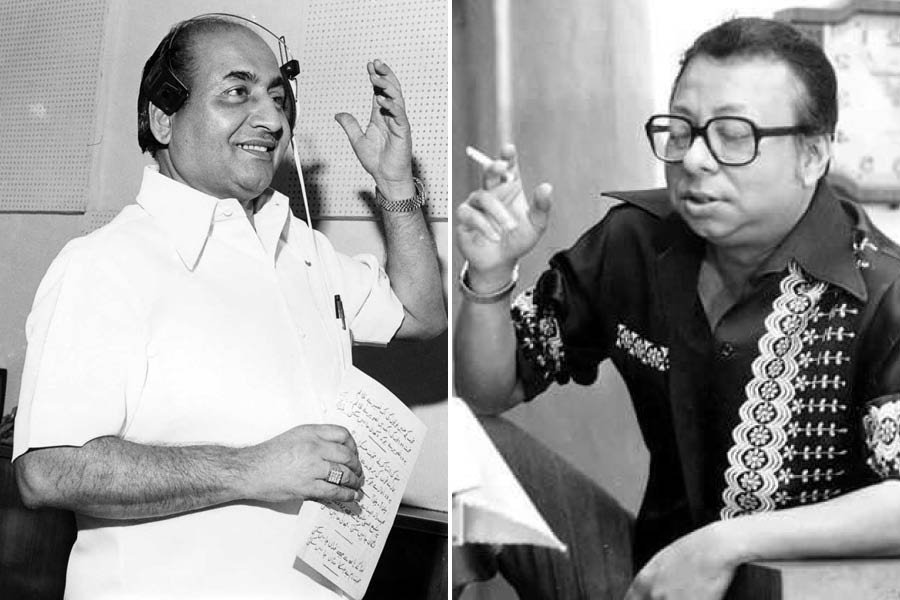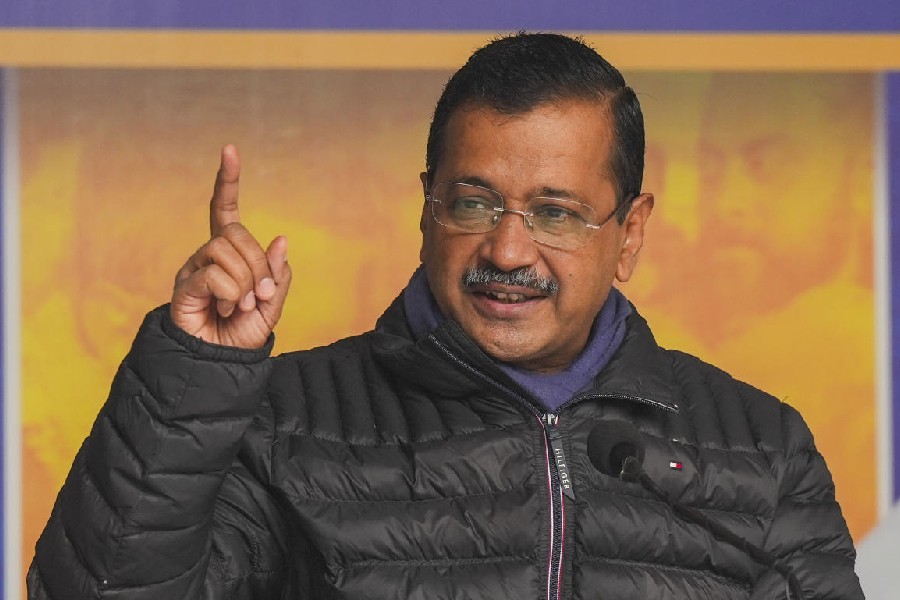Two singers. One a young man in his early 30s, known more for his work in Marathi films, trying to gain a foothold in the Hindi film industry. The second a legend, arguably the greatest playback singer Indian cinema has had.
A composer who had been without doubt the flavour of the decade, whose music had defined the 1970s.
A song that is lost in the mists of anonymity, brought up in academic debates by die-hard fans of the composer. A song that needs to be rediscovered for its sheer brilliance – its elegiac melody, the dark philosophical undertones of its words, its one-of-a-kind rendition by the young singer. And above all, for a legend’s gesture towards his younger colleague.
The song: Sukh dukh ki har ik mala.
The young singer: Chandrashekhar Gadgil.
The composer: RD Burman.
The legend: Mohammed Rafi.
Chetan Anand’s reincarnation drama Kudrat, starring Rajesh Khanna and Hema Malini, is today known for its hit songs Humein tumse pyaar kitna, Tuney o rangiley, and even Chhoro sanam. Lost among these is Sukh dukh ki har ik mala, and with that the story of Rafi’s gesture towards Chandrashekhar Gadgil.
RD Burman had composed and recorded the song, all four stanzas, with young Gadgil. And the singer had done a masterly job of it, with a rough-edged, earthy voice that seemed tailor-made for the foreboding strains of the composition. However, the film’s producers began insisting on getting Rafi, who was on a comeback trail, to render the song, replacing Gadgil. This was quite a common occurrence and composers often had to give in to the director’s or producer’s whims (RD Burman had been at the receiving end of other producers’ diktats, for example, when he was compelled to rehash ABBA’s Mamma Mia as Mil gaya, humko saathi in Hum Kisise Kum Naheen). Here too there was no way out but to do as told.
RD approached Rafi and the recordings began. He had recorded three antaras when he learnt of the song having already been recorded by Gadgil. Distraught at the prospect of snatching away his young compatriot’s opportunity of a lifetime, Rafi told the composer that he would have nothing to do with the song. That he did not approve of it at all and would not lend his name to the song. He refused to sing the fourth stanza.
What makes this particularly heart-warming is the fact that Rafi was just emerging from a decade-long lean patch when most filmmakers had abandoned him for Kishore Kumar. He was only beginning to find his feet again. He could well have accepted the situation silently, like many of his compatriots did, in particular Lata Mangeshkar and Asha Bhosle who had no qualms about redubbing a song recorded by someone else. But then Rafi was made of different mettle. He wouldn’t be Rafi otherwise.
Eventually, the film released after Rafi passed away. The producers had their way, and Rafi’s version played in the film’s soundtrack (the credit titles and in the background) though Gadgil is mentioned as one of the playback singers. However, the film’s LP record still has only the Chandrashekhar Gadgil version. Rafi did not deprive him of credit.
Apart from demonstrating Rafi’s unique generosity, the episode is also symbolic of a number of RD Burman compositions for Rafi: wonderful melodies, rendered by Rafi as only he could, but languishing in the shadows because the film flopped and with it the music went nowhere.
Fans of the singer allege that RD Burman and his preference for Kishore Kumar spelled the death knell for Rafi’s career in the wake of Aradhana (1969). It probably says something about how fate plays its hand and as a portend of things to come, that a song composed by RD and sung by Rafi for a Guru Dutt film remained unreleased, with the tune (inspired by the theme of Bridge on the River Kwai) finding its way to Dev Anand’s Jewel Thief and becoming a blockbuster in the voice of Kishore Kumar.
It is true that right through the 1970s, RD gave a majority of his songs to Kishore Kumar. It is also true that when Rafi’s career as a singer is mentioned, the composers who come to mind are Naushad, Madan Mohan, Shankar-Jaikishan, Ravi, OP Nayyar and SD Burman. RD rarely finds a mention.
However, that is an incomplete understanding. Rafi won one National Award as Best Singer. And that composition belongs to none of the composers we generally associate Rafi with. His one National Award-winning song – Kya hua tera waada (in Hum Kisise Kum Naheen) – was composed by RD. And a trivia: RD had composed the tune of the mukhda back in the late 1960s – one can hear it played on the violin in the delayed film Phir Kab Milogi.
This was just one of RD’s sensational compositions for the singer. There are others, like the chartbusters in Teesri Manzil (surely among Rafi’s finest) and Pyar Ka Mausam (who can forget the mesmerising Ni sultana re) before Kishore Kumar took the industry by storm in 1969.
Even after that, and even as other composers of the era turned to Kishore, RD would time and again give Rafi the best he had. In Yaadon Ki Baraat, for example, it goes without saying that Chura liya hai is by far the most melodious song, though the Kishore numbers probably rule the airwaves. In Caravan, RD jettisoned Kishore altogether, giving him just one song. It is Rafi who drives the caravan with three of his best duets ever, which also rank among RD’s finest. And in Hum Kisise Kum Naheen, though Rishi Kapoor and Kishore Kumar win the song-and-dance competition (with Aa dil kya and Mil gaya), there is no doubt who the real winner is. Not only does Rafi have Kya hua but also the gooseflesh-inducing dulcet Chand mera dil, the riotous qawwali Hai agar dushman and the enchanting Ye ladka hai Allah.
In between there were individual hits that escape consideration when we talk of Rafi’s collaboration with RD. And these span genres. Consider the hypnotic romanticism of Rut hai milan ki (Mela, 1971), and how Rafi’s call ‘saathi meray aare’ evokes the longing of a moon-drenched night under the stars. There’s also the wayward and rambunctious strains of Gulabi ankhen (The Train, 1970. Or the languorous, steeped in sensuality Maine poochha (Abdullah, 1980).
At the same time, there are a number of songs that have been lost in the mists of time, tucked away on one forgotten side of a vinyl or cassette in the middle of other chartbusters of the era or even in the same film. Among the best of these, across a whole spectrum of emotions, are:
Ilaahi Tu Sun Le (Chhote Nawab, 1961)
RD Burman’s debut as independent composer had some lilting compositions (including the much-discussed Lata Mangeshkar solos Ghar aaja and Matwali ankhonwale), but few better than this where Rafi’s voice, with the lisp, does full justice to the character of the man-child played by Mehmood. Just listen to the childlike pleading that he infuses his voice with.
Tumhe Dekha Hai (Chandan Ka Palna, 1967)
Few did the sensual as evocatively as Rafi and this one, shot on Dharmendra, is right up there with others like, say, Chhulene do nazuk (Kaajal, 1965). Close your eyes and experience the tremor in the voice divine caressing your senses.
Zamane Ne Maare (Baharon Ke Sapne, 1967)
Lost in the brilliance of Aja piya tohe pyar doon and Ka janun sajan and the exuberance of Chunri sambhal gori, is this elegy for the lost dreams and hopes of a whole generation of youth. Majrooh Sultanpuri’s mournful words find the perfect voice in Rafi in this exquisite RD composition suffused with all the sorrows of the world.
Waadiyan Mera Daman (Abhilasha, 1968)
Believe it or not, Sanjay Khan makes his third entry (after Mela and Abdullah) in this feature with another classic RD-Rafi number. This sublime song has Rafi in great form conveying the pathos and longing of love like few singers managed. The film has long been forgotten. The song can still move your heart.
Che Khush Nazare (Pyar Ka Mausam, 1969)
Another lost gem in an album brimming with gems – Ni sultana re, Tum bin jaoon kahan (which has long been the subject of debate between Rafi and Kishore fans) – this one has Rafi at his exuberant best. The moment you hear him call out ‘che khush nazare’ in the prelude to the song, you are transported to verdant valleys, dappled sunlight redolent with mellow memories beseeching you to walk the ‘gulon ki waadi, saba ki basti, gali baharon ki’.
Rekha o Rekha (Adhikar, 1971)
The infectious beats of RD’s composition get the perfect foil in Rafi’s lively rendition of this joyful ditty. A favourite on AIR’s Jaimala in the late ’70s, this is Rafi at his playful best, reminiscent of the Shammi Kapoor masti-bhare geet of yore.
Pagal Zamane Mein (Mazaaq, 1975)
One of the many mysteries of the choices that composers make when it comes to singers, this zany number is right up Kishore’s street. And yet, it is Rafi who gets to render it, and he owns it and how. This is madness, Rafi style for RD. Interestingly, for those who swear by the classic songs of Anand, Rajanigandha and Chhoti Si Baat, this madcap number is written by Yogesh.
Naghma Hamara (Bundal Baaz, 1976)
Lost in the maze of flops that Rajesh Khanna delivered around the mid-1970s was this ‘fantasy’ yarn directed by Shammi Kapoor, which is rather fun if you are so inclined. In a film that has a couple of peppy Kishore Kumar numbers that fans of the singer and composer have kept alive, this duet barely finds a mention. The tune would wallow in oblivion and meander through a couple more versions in other films before it found its home and posterity in Saagar as Saagar kinare.
Pyar Hai Ik Nishan (Mukti, 1977)
By 1977, Rafi was making a comeback with Amar Akbar Anthony and Hum Kisise Kum Naheen. While these films gave him the chartbusters, this classical-based gem remained unsung in an album in which two other songs — Suhani chandni raatein and Lalla lalla lori — became quite the rage. The song – playing out in the title credits and in the background to the narrative at crucial moments – conveys the film’s philosophical messages on love, death and memories, the themes of this melodrama. And who better than Rafi to do it full justice.
Jab Ek Qaza (Devata, 1978)
A rare Gulzar song by Rafi that lost out to the two more popular Kishore Kumar-Lata Mangeshkar duets, Gulmohar agar tumhara naam hota and Chand churake laya hoon. Like the song in Mukti, this too plays out in the background with Rafi’s voice conveying, with all the gravity at its disposition, the inevitability of suffering as long as you are alive: ‘Jab tak jeete ho jalte raho, jal jaao toh kahna maaf kiya, jal jaaye zara si chingari, toh aur hawa mil jaati hai’. Gulzar’s words – ‘Jab ek qaza se guzro toh ek aur qaza mil jaati hai’ – bring to life in Rafi’s plaintive tenor the ultimate human condition, travelling as we do from one judgement day to another (the word qaza stands for fate, destiny, judgement day) in this adaptation of Victor Hugo’s Les Miserables.
Raqqasa Mera Naam (The Great Gambler, 1979)
Rafi gives this intoxicating duet with Asha Bhosle a rush of adrenalin with his voice. Just listen to him articulate ‘Marhaba aye dilruba… tauba’ and one just wants to die in the arms of the beloved. There’s only one word to describe both the composition and its rendition: scintillating. Helped no doubt by Amitabh Bachchan and Zeenat Aman raising the heat quotient with their performance.
Pal Do Pal Ka Saath Hamara (The Burning Train, 1980)
No one sang the qawwali better than Mohammed Rafi. And there are few better than this duet in his oeuvre. Sahir’s affecting lyrics on the transient nature of human relationships benefits immensely from RD’s magical treatment to the music (alternating between the classic approach to the traditional qawwali and the ominous Western beats as Dharmendra races on a car to stop a bomb ticking away in the train) and the zestful picturisation. But it is Rafi who nails it, and in the light of his passing only months from the film’s release, imbues the line ‘Umr ka rishta jodne waaley, apni nazar mein deewane hain’ with a rare poignancy.
It is telling that in these last few months of his life, Rafi rendered some lovely ditties for RD, a few of which made it to the charts after his death, including Yamma yamma (Shaan, 1980), Kaun kisi ko (Kaalia, 1981) and Poochho na yaar (Zamane Ko Dikhana Hai, 1981). There are many such Rafi songs composed by R.D. Burman that have languished in obscurity, among them Ye choodiyan nahin (Balika Badhu), Sundar ho aisi tum (Dil Ka Raaja), Ae jaanejahan (Chhalia), Mere liye aati hai raat (Raaton Ka Raja), Naag devta (Shalimar), Aa raat jati hai (Benaam), Kaahe ko bulaya (Humshakal), Hum jab ek saath hain (Bulundi), Na sharab se (Salaam Memsaab), Mohabbat mein aji kya (Phandebaaz) and Botal se ek baat (Ghar).
Even as we celebrate the voice of god for all his chartbusters, let’s raise a toast to these unsung melodies, for as Thomas Gray said: ‘Full many a flower is born to blush unseen / And waste its sweetness on the desert air.’











